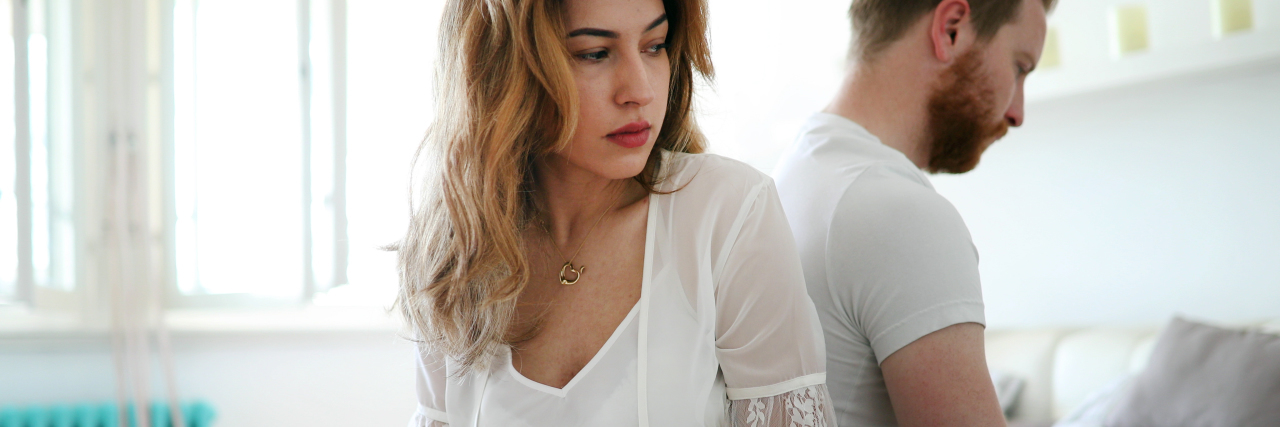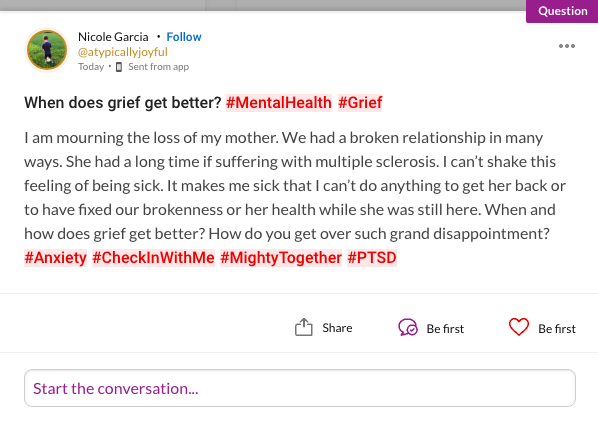What It's Like Loving Someone Who Wants to Die
Editor's Note
If you experience suicidal thoughts or have lost someone to suicide, the following post could be potentially triggering. You can contact the Crisis Text Line by texting “START” to 741741.
This story has been published with permission from the author’s husband.
This has been one of the hardest years my husband and I have had together. In January we watched his mum die (after losing his Nana in just November the year before). I got hit with a chronic illness that leaves me in bed three to seven days of the week. And he has fought suicidal depression.
We haven’t talked much about this outside of our family, as we didn’t want to make it super public, but he has started to find his voice and speak about what he has gone through, and he gave me permission to do the same.
All this year my husband has fought his own mind to stay alive. This isn’t the first time he has experienced this — depression nearly succeeded in taking his life when he was 16. Some days this year he has barely held on, his exhaustion and hopelessness overwhelming him.
Loving someone who wants to die is rough. Your heart aches and bleeds for them and there is nothing you can say or do to make it better. If cuddles could squeeze out depression then he would be cured. If kisses could fix mental boo boos then he would be fine. If love alone could make him happy then I know he would be full of joy all the time!
If you have insight to share with this Mighty member, join the conversation below:
Some days are better than others. Some days are merely “meh,” where he feels little but can still have a laugh. Other days I hold him in bed while he weeps and asks when he will feel better. Some days I can go out and not worry at all. Other days I have seriously wondered if I would find him dead in the house somewhere.
Living with the reality that the person you love most could take their life at anytime is one of the hardest things I have had to face. And seeing the amount of pain he is in, I wouldn’t blame him or be angry. I would understand that he was exhausted, that he couldn’t fight anymore. I see his exhaustion and I wish I could give him strength to keep going. I know in some ways I do, I know I give him the emotional support and strength he needs, but I can’t give him the physical strength that I want to.
I have watched the man I love in a battle for his life and I have been unable to fight with him. I have only been able to stand on the sidelines and cheer him on. We both understand mental health so we checked all the boxes on what you are suppose to do — we got him on medication, we made sure he ate regularly and (mostly) well, we tried to get him to exercise as much as we could.
Thank God our doctor took us seriously and got him on the best medication straight away. We called helplines and reached out for psychiatric help, but the mental health system in our country is so broken. It is now December and we are still waiting for the mental health team to contact us. We have had no professional help from psychologists as there is no help available in our town. We have yelled and screamed for someone to help us, but even as an urgent case there is still months of waiting. So we have battled without psychological help. Ads on TV tell young men to reach out for help with depression, but what if there is no one there at the other end when you do?
Depression doesn’t just affect the person who has it. It takes a toll on their family too. We are both running on empty, both exhausted mentally and emotionally and we don’t know how long it will be before the mental health system swoops in to help us.
My husband is one of the strongest people know. He has had to battle his head every day just to survive and he is still here. I see his exhaustion and the pain he is in and I am so impressed that he keeps going. My heart has been broken for him over and over and I know it is only God that gives us both the strength to face this.
We are lucky. We have amazing friends who care so much about us. Friends who drop everything and come to take him out. Friends who cook us meals. Friends who ask if I need a break. Friends who pray and fast for us. We could not have done this year without them.
But the reality is my husband could kill himself at any time.
When this thought first hit home I rebelled against it. I screamed at it, put my fingers in my ears and hummed to drown it out. I refused to accept it and flat out ignored it. And yet it persisted.
Opening my eyes to his reality was like a slap in the face. If I was to help him then I had to acknowledge how bad his illness was. Earlier this year, we had watched his mum pass away from terminal cancer. His depression is slowly eating away at his health and ability to function. And just like that cancer, it could kill him. I had to face that reality.
Surprisingly, when I did turn and face it I found freedom. I was able to acknowledge that it was not my responsibility to fix him. Just as I couldn’t fix the cancer through my love and care, so I couldn’t fix this depression. I couldn’t argue him into thinking happier thoughts. I couldn’t love him into happiness. I couldn’t take away his pain. And as much as that hurt, it also taught me about my limits as his wife.
I can’t heal my husband. But I can love him. I can advocate to doctors for him when he has lost his voice in the darkness. I can remind him of days when we were happy. I can hope for both of us for days when we will be happy again. I can hold him when he cries. I can pray for him, screaming at God for both of us. I can encourage him. I can cajole him to push just a little bit longer.
But I cannot fix him.
If he dies from this it is not my fault. It is not because I didn’t try hard enough or love him enough. It is an illness that saps all desire and strength to live. It is the place of doctors and psychologists to help him with the illness itself. I can let go of that responsibility and simply love him for where he is at. It is not my fault.
Accepting this means I am free from the burden of being the person who has to keep him alive. I can’t do that, not alone. It takes a community of medical professionals, friends and family. I am free of the responsibility and guilt if depression takes his life. Just as I am not guilty for cancer killing his mum, so I am not guilty of depression killing my husband.
Though I am free of this burden of responsibility, it doesn’t mean that this is easy. The thought of him dying terrifies me. I lie awake tonight, one of many nights, listening to him sleep and grinding his teeth, knowing that this is yet another expression of internal anguish, and it hurts me physically to know he is in pain and I cannot help him. I want to wrap him in my arms, tell him it will be OK and to fix his mind. I want to crawl into his brain and rewire it. I want to fix it.
But I cannot, and it is not my fault.
I have heard many stories of people who have lost loved ones to this illness and many experience guilt around not being able to help the person. I don’t know how I would feel if it actually happened to us, but I know that, for now, I am free of that guilt and that allows me the room to love him well. It means I can love him without fear, without blame, without him feeling guilty that he is not better for me. I can simply love him for where he is at and be at peace with that.
This is not his fault. Nor is it mine.
Follow this journey on From the Well.
Getty image via nd3000


